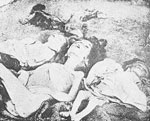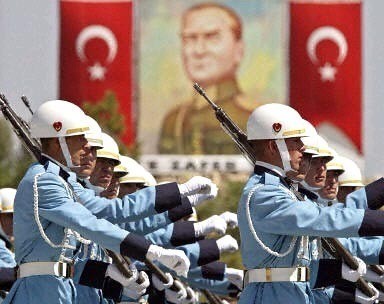Wednesday, October 31, 2007
Ciwan Haco - Yerivan ( Yerevan )
Famous Kurdish singer Ciwan Haco from western Kurdistan, Qamishlo (Syria) sing about the capital of Armenia in Kurmancî.
Ciwan Haco is famous for his rock n roll and progressive music.
Tuesday, October 23, 2007
Holocaust denier Ahmadinejad in Armenia
 President of Armenia - Robert Kocharyan
President of Armenia - Robert KocharyanIranian president Ahmadinejad is currently visiting Armenia for private meetings with the Armenian president Kocharyan, Ahmadinejad will hold a speech in the Armenian parliament.
Mahmoud Ahmadinejad will also visit the Armenian Genocide memorial and the institute museum of the Armenian Genocide in the capital of Armenia and will leave Armenia tomorrow.

Today, Ahmadinejad made a symbolic speech in wich he avoided the word "genocide" in the Yerevan State University.
“Iran’s stand on the events of early 20th century in the Ottoman Empire bases on two principles, the first principle is that each nation should remember its history but face the future and this must not lead to repetition of the past. Second, Iran will always be by Armenia’s side” he said.
- Why should Germany not remember its history?
- Why was this "infringements of human rights" not a genocide?
Ahmadinejad is a holocaust denier and claims that no Jew have been killed during WW2 by Nazi-Germany.

Sunday, October 21, 2007
Turkey - fighting many battles
Other international genocide recognition has been made from countries like France, Argentina, Vatican city but also from Kurdistan.
Turkey immediately recalled the Turkish ambassador from U.S. because of the Armenian genocide bill. Since the genocide bill, the Turkish-US relation has since then been bad.
The Turkish president Abdullah Gül warned Bush that the genocide bill would hurt the ties between the countries, now Bush warns Gül not to enter southern Kurdistan (Iraq).
This genocide bill comes inappropriate for Turkey just as they had plans of (for the first time officially) invade southern Kurdistan. The excuse for invading S.Kurdistan is to fight the PKK guerrilla, but its obvious that Turkey has a hidden agenda.
It is S.Kurdistan they want to crush so that the northern Kurdistan (Turkey) Kurds wouldn't start fighting again for the Kurdish lands.
The Turkish PM Erdogan has once said:
"We wouldn't accept a Kurdish government, even if it was in Argentina".
Wednesday, October 10, 2007
Christians prays for Kurdistan and the Kurds
This material was found on http://centralasia.imb.org/
Exact Source

“Arise, shine, for your light has come, and the glory of the Lord rises upon you. See, darkness covers the earth and thick darkness is over the peoples, but the Lord rises upon you and his glory appears over you.”
Please take a moment to pray for the light of Christ's love to reach the Kurdish people.
Each photo is a prayer point.
For the past five centuries the Kurds of Central Asia have been forced to live under oppressive regimes and to seek refuge out of their traditional homeland. The oppression the Kurds have experienced has led many of them to believe that they are among the most hated peoples of the world. The Kurdish proverb, “Kurds have no friends,” expresses that sentiment. Despite the suffering the Kurds have endured, they remain a culturally distinct people. Please pray for the Kurdish people to find their worth and home in Jesus Christ. Pray also that God would provide redemptive friendships for the Kurds that they would come to know the Lord intimately.
 While there are an estimated 25 million Kurds throughout the world, over 5 million live in Iran. Primarily located in the northwest region, the Kurds are a marginalized group of shepherds, farmers and merchants. Kurdish children have limited access to education and many remain illiterate. Illiteracy among the Kurds creates an obstacle to sharing the gospel with them. In addition to literacy issues, the Kurds of Iran speak four different dialects of the Kurdish language, making it difficult to share the gospel of Jesus with them. Please pray that oral methods of sharing the gospel, such as audio Bibles, Christian radio broadcasts, and praise and worship music translated into the Kurdish dialects will reach the ears of Kurds in Iran.
While there are an estimated 25 million Kurds throughout the world, over 5 million live in Iran. Primarily located in the northwest region, the Kurds are a marginalized group of shepherds, farmers and merchants. Kurdish children have limited access to education and many remain illiterate. Illiteracy among the Kurds creates an obstacle to sharing the gospel with them. In addition to literacy issues, the Kurds of Iran speak four different dialects of the Kurdish language, making it difficult to share the gospel of Jesus with them. Please pray that oral methods of sharing the gospel, such as audio Bibles, Christian radio broadcasts, and praise and worship music translated into the Kurdish dialects will reach the ears of Kurds in Iran.
Life for a Kurdish woman is centered in the home. As a young bride she must move into her mother-in-law's home and take on every chore—drawing the family's water, milking the family goat, preparing each meal, cleaning the house and raising the children. She often endures verbal and physical abuse from her mother-in-law and other members of her husband's family. Please pray that the hope of Jesus Christ touches the hearts and lives of these women. Pray that they will have the opportunity to feast on the Bread of Life even as they care for their families.






There are a few Kurdish followers of Jesus. Most Kurds are like lost sheep without a shepherd. The Muslim Kurds of Iran are among those lost sheep. Please pray for Kurdish believers in Jesus to develop a vision to share the gospel with their fellow Kurds in Iran. Pray that the Kurdish believers would be relentless in their pursuit of these lost sheep. Pray that the Kurds of Iran would recognize Jesus as the only way to salvation.
“I am the gate; whoever enters through me will be saved. He will come in and go out, and find pasture ... I have come that they may have life, and have it to the full.”
—John 10:9-10
The Kurdish people need to experience the hope of the life-giving message of Jesus Christ. The Lord desires that all Kurds come to know Him. Pray that God would be glorified among the Kurds of Armenia, Turkey, Iran, Iraq and Syria. Pray that the Kurds themselves would become advocates for the gospel of Christ throughout the world.
Friday, October 5, 2007
Kurdish and Armenian communism
In the year of 1980 these organisations held a press conference, there they declared and made they're cooperation public in Sidon. The cooperation lasted until 1983 when ASALA disappeared in the Lebanese Beqaa Valley that PKK established its camps.
Later on, the cooperation between PKK and ASALA became stronger until the end of the 90´s when the PKK leader Abdullah Öcalan was captured.























